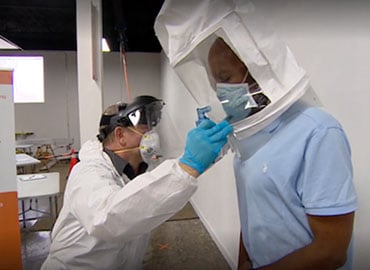Dentists gearing up for new normal of wearing full protective gear amid COVID-19

‘There’s no opportunity for social distancing in dentistry,’ says Dr. Peter Nkansah
Dr. Peter Nkansah, a Toronto dentist and anesthesiologist, gets fit tested for an N95 respirator at Act First Safety in Scarborough. (Paul Borkwood/CBC News)
Dr. Peter Nkansah, a Toronto dentist and anesthesiologist, isn’t sure when his clinic will reopen for non-urgent dentistry. When it does, he expects to be wearing protective gear from head-to-toe.
“Your dentist, unfortunately, is not going to look the same way your dentist did,” he says.
Much of Nkansah’s work involves being just inches from patients’ open mouths. He’s now among the dental professionals preparing to don full personal protective equipment (PPE) once they’re allowed to see patients again regularly — including equipment like an N95 respirator, gown, and full face shield.
As COVID-19 maintains its grip on society, dentists are straddling a strange line between two worlds.
Like many businesses, they’ve been largely shut down, but they’re also health-care professionals who typically work closely with potentially contagious patients.
Most dentists have been handling emergency procedures since Ontario’s state of emergency began, but so far provincial officials say there is “no timing” yet for dental clinics to fully open back up.
Amid the uncertainty, Nkansah is spending a weekday afternoon getting fit tested for an N95 respirator so he’s ready whenever that day comes.
Inside a large training space at Scarborough-based Act First Safety, a company offering occupational health and safety training, Nkansah is wearing his respirator underneath a large, see-through, dome-shaped hood.
Trainer Brad Jackson adds a few bitter-tasting sprays into the hood while Nkansah moves his head left and right, up and down — ensuring there are no leaks, otherwise he’d notice a bitter taste in his mouth.
Lauren McFarlane, president of Act First Safety, says more dental-clinic staff are coming in for these kinds of appointments, since most are planning to wear high-level protective gear for the first time when they return to work.
Typically, these fit testing sessions were offered once a week; now the company is seeing at least 50 clients each day, four days a week.
Amid the growing desire for personal protection in dentistry, the Royal College of Dental Surgeons of Ontario is also warning about “dire shortages” of personal protective equipment for dentists, much like the red flags raised by health-care professionals in the hospital sector and in long-term care.
“We continue to raise with the Ministry and others the importance of creating a reliable PPE supply chain for dentistry as soon as possible,” the college’s president Dr. Flavio Turchet wrote in an open letter to dentists in April.
“My hope is that everyone is protected,” Nkansah says.
“There’s no opportunity for social distancing in dentistry; it just can’t happen.”
